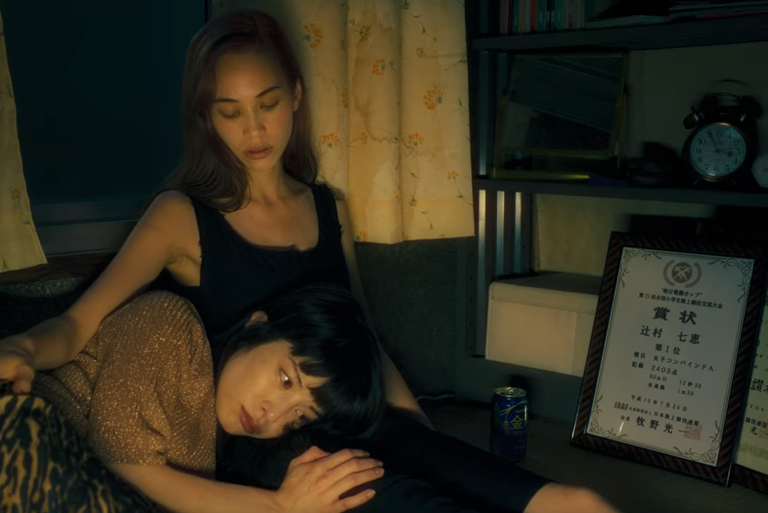Ride Or Die
Director: Ryuichi Hiroki
On the Hunt
For those of you who think that Ride or Die may be a good first date watch, or possibly a good recommendation for a family screening, let me go ahead and tell you to pump your breaks now and turn back, for blood and boobs lie ahead folks, and this certainly isn't a buddy cop film with the acting talents of Smith and Lawrence. Indeed, the term 'buddy' may be appropriate for vastly different reasons in this offering, and this is a piece of cinema best enjoyed alone or in n the company of more adventurous cinephiles. Please don't say that I didn't warn you. We begin our story in a bar, the film's gorgeous leading lady striding through her setting like a leopard through the Serengeti, her light scarlet hair radiating like the focal point of her mysterious intentions, her stoic expression impossible to resist as we see in the latter parts of the film's opening stanza. OK, I exaggerate a little concerning the opening scene, but there is a clear purpose in the movements of our main character, an almost frustrated desire that only finds ease once her quarry has been found.
After seducing a downtrodden man at the bar, our couple departs to the gentleman's abode, a request made despite full knowledge of the man's marital status. The promise of hope, loyalty, and love act as the exciting backdrop in which a sordid affair would find its lustful expression. However, in what feels like a familiar homage to Basic Instinct, this act of love-making turns into a full-blown massacre, the unfaithful bargoer falling victim to the wrong end of a scalpel, and then to the very wrong end of a piece of broken glass. So amid the aftermath of the chaos, our victim lying in a crimson puddle on the innocent snow-white sheets of the master bed, we come to ask what is it that we have here, a kind of serial killer that gets her rocks off by punishing unfaithful husbands, or is there more at play that has yet to be made apparent? Well, Ride Or Die takes the middle point as its start before going backward to fill in the missing pieces, by no means an original approach, but not necessarily a bad one when it comes to building intrigue and general curiosity.
The Phone Call
As it turns out, our crimson-haired predator is a highly successful plastic surgeon who comes from an equally successful and affluent family, the only blemish in an otherwise well-ordered life being the necessary omission of her sexual preferences. However, it is one faithful phone call that would serve as the proverbial first domino nudged on its way towards destruction, gently pushed over when our main actress, Nagasawa Rei, agrees to meet an old high school crush...her first crush....the one that got away as it were. Indeed, Tsujimura Nanae would seem to enjoy a hold over Rei that the latter could not break free from even in her wildest dreams, and her curiosity over the motives for this significant character of her past to make contact is one that she simply couldn't resist. Perhaps the reference made earlier in this piece was an appropriate metaphor when we consider what lies in wait for curious cats.
As it would turn out, Nanae went on to find herself in an abusive relationship, enter our bargoer who came to feel the wrath of a long-time admirer of his wife, but we viewers are transported to the past where a young Rei would previously play heroine to Nanae in a time of need and within a marketably tamer setting. As is often the terrible plight of homosexuals who know that the feelings they harbor for their love interests are feelings that will most likely never be reciprocated, Rei could only observe the athletically gifted Nanae from afar, and yet one crucial moment would in many ways foreshadow the unorthodox state of affairs between the two characters, affair being a rather appropriate word for present purposes. With a tumultuous home situation and a career-threatening injury, Nanae would act out an action of defiance and rebellion that would at the very least strike a small blow to a life that had taken so much from her. Stealing a pair of running shoes from the local sports store, she would run, run, and run some more, certainly not in a manner that expected to succeed in this less-than-subtle caper, but one that simply rebelled against the backdrop, or rather, the consequences of the act committed. Yet even after being caught, it was Rei who would come to the rescue, paying for the sneakers to absolve her love interest of her wrongdoing, and even go further by offering to pay for her schooling. This act was not, however, done out of altruism, but was done with a very particular expectation, the expectation for sex if this loan could not be paid back in the future.
Unfortunately for Rei, her sexual desires would amount to naught when Nanae managed to pay back her debts and then some, having married into money, money that would, unfortunately, be in the hands of an extremely insecure and unhinged partner, thus bringing us back to our bar scene, and proceeding murder. Yet, this extreme act of love/lust would at least be repaid to some degree when Nanae picked Rei up in her car after the grizzly act was committed, and the two would ride off into the night, baying at the moon like wolves drunk on the excitement momentarily brought on by their acts of rebellion, taking off on their own Bonny and Clyde love story and committing themselves to running as long and far as they could. Yet, the tragedy with any high is that one must eventually come down from it, and the coming down of this state of affairs is a crash unlike any other.
Let us pause for a moment, for as is often my style, a full analysis requires me to give away some if not all the juicy tidbits of this particular offering, so I once more give fair warning to my readers as to what lies ahead and recommend you go and watch Ride Or Die before proceeding forward.
 Screenshot
Screenshot
Run
Welcome back, folks. The relationship between Nanae and Rei is the focal point of the film, their necessitated nomadic existence punctuated by the highs of forbidden freedom both in their acts, intentions, and feelings, and the lows of uncertainty in the very reciprocal nature of their relationship, and the inevitable fate of their actions. I feel in this case an undeniable urge to give Ride or Die an almost Christian reading regarding the concept of love, and while I can certainly hear the undeniable sound of eye-rolling over my clacking of laptop keys, I nonetheless ask readers to bear with me and to keep an open mind. Both Rei and Nanae are interesting for vastly different reasons. Rei's actions very clearly declarations of love, although one may argue that her idea of love is incomplete precisely by virtue of its insistence on reciprocation. We see three very distinct sacrifices that She makes for Nanae, and how it is only her third act that rings true as one that is worthy of the designation of love.
Nanae, in contrast, withholds her affections like a tightly guarded secret, showing no small degree of selfishness in her actions when balanced against Rei's. Her reaching out to her past "savior" represents an act that is well aware of the influence that she has over her, an advantage that she still grapples with as the movie progresses and one she struggles to fully understand or trust. Indeed, the nature and potential of their relationship is one she battles to make sense of, and she appears both willing yet simultaneously cautious as to how far she pushes her manipulations, seeming to be reluctant to commit altogether to someone she couldn't stand to feel inferior to, while nonetheless not being blind to the love that Rei has for her, and the extent that she would go to prove it.
Ride or Die?
Speaking of love, let's look at how it is expressed in this offering. Our pink-haired femme fatale's first act was a small sacrifice over running shoes, giving very little of herself to give Nanae hope for the future, indeed, a future altogether. The second, more extreme act was the taking of a life, certainly no small gesture, but one that, similar to the first, expected a return, even if it was only a recognition of the degree of her affection to the act. Yet it is the third and final act that I found to significantly gain its full return in so far as it expected none, it is the act that breaks the false dichotomy that the film title brings to the for, indeed, the introduction of the third and legitimate option over that of riding(livin/surviving) or dying, and that is love or loving. Rei hands herself over in the end knowing that her whole life would be reduced to ash, and yet as she pays the ultimate price, she is given the affirming promise that provides her with that elusive and valuable gift of hope when Nanae offers up the four beautiful words that punctuate this entire endeavor, "I'll wait for you."
I enjoyed Ride or Die, and certainly not merely for the sexual tension and erotic possibilities that radiated between these two attractive leading ladies. Instead, I found in this cinematic offering a deeply moving and even tragic portrayal of love, especially a forbidden love that a highly rigid society frowns upon when it is a love that struggles in and through the modes and expressions of homosexuality. Both Rei and Nanae differ in their respective feelings toward one another, but what does act as a common thread, indeed a connecting thread is their desire to be recognized in full. Nanae desired to be recognised as a social and economic equal to a woman she owed a monetary debt to, while Rei desired more than anything to be recognized as a romantic possibility in any capacity.
It's a film that asks the age-old question of whether or not love truly is enough to weather the tumultuous storm that we call life, and it's a film that excites and intrigues as to how these two fugitives enjoy the highs and lows that come from a life lived on the run. As I write this, I cannot for the life of me speak to any pertinent technical aspects of this film, or even bother to say whether or not it is good. I suppose I take any film to be good when it can keep my attention for the entirety of its run time, and especially if it can invoke various emotions within me, and emotions will be invoked, ladies and gentlemen. So give this one a whirl, for I think it's a ride that most will enjoy. Till next time.

